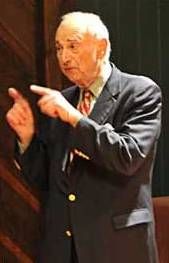High-speed rail brief includes Quentin Kopp objections

 It might take more than a cow catcher to push Quentin Kopp from standing in the middle of the track trying to stop California’s high-speed rail project. A former head of the California High-Speed Rail Authority, which oversees the project, he also is a former state senator and Superior Court judge.
It might take more than a cow catcher to push Quentin Kopp from standing in the middle of the track trying to stop California’s high-speed rail project. A former head of the California High-Speed Rail Authority, which oversees the project, he also is a former state senator and Superior Court judge.
On March 17, his declaration against the project became part of the court record in the lawsuit by Kings County and two if its residents whose property would be taken, John Tos and Aaron Fukuda. The plaintiffs included his declaration in their court brief filed that day with California’s Third District Court of Appeal.
The Court of Appeal is considering the CHSRA’s appeal to have the case dismissed. If the case is allowed to continue, it will return to the courtroom of Superior Court Judge Michael Kenny.
In his declaration, Kopp wrote:
“As Authority Chairman, I appeared several times before legislative committees in the Assembly and the State Senate testifying on HSR plans. The Senate Transportation Committee, then under the chairmanship of State Senator Alan Lowenthal, particularly participated in developing the statutory language of AB3034 and, hence, the language of the underlying ballot measure which became known thereafter as Proposition 1A.
“I was familiar with the concerns of various legislators and professed objectives and desires concerning language of Proposition 1A. I was also well-aware of the intent of the Authority in conforming its implementation of HSR plans to satisfy legislative concerns and the Authority’s ability to fulfill promises that would be made and were made to California voters in the November 4, 2008. …
“In my opinion, the HSR project, as it has evolved in the 2012 Authority’s Business Plan, is no longer a genuine HSR system, as covenanted to California voters and the Legislature. Instead, it has been distorted in a way directly contrary to the high speed rail plan the Authority attempted to implement while I was Chairman, namely, a true HSR system containing all the features, terms and protections desired by the Legislature and honoring restrictions placed upon use of Proposition 1A bond proceeds by the Legislature. Accordingly, it is my opinion the project is not lawfully eligible to receive Proposition 1A bond funds.”
Court case
The Third District Court of Appeal in Sacramento will not just review the rulings of Judge Kenny, it will be reviewing all the evidence in the case. That will allow project opponents the chance to win additional arguments previously not granted by the Superior Court.
In filing their answer before the Court of Appeal to the CHSRA’s court filing, Kings County, Tos and Fukuda have introduced something new. They want the court to invalidate the Legislature’s 2012 vote to appropriate $8 billion to the rail project. (Judge Kenny had not required a reversal of that vote in his August 2013 ruling advancing the case.)
Wrote Stuart Flashman, co-counsel for the plaintiffs, in a court brief:
“Not only did the Authority’s Funding Plan itself violate the bond measure’s requirements, but the presentation to the Legislature and the Governor of an inadequate Funding Plan violated the procedure the bond measure had mandated to assure that any appropriation of bond funds would be made prudently and based on full and accurate information. Because the inadequate Funding Plan violated the protective measures intended and approved by the voters, and undermined the reliance the voters had placed on the review of that Plan, the resulting appropriation of bond funds should also have been declared invalid.”
CHSRA position
The position of the CHSRA all along is that it is complying with Prop. 1A. Kopp’s successor as chairman, Dan Richard, told the New York Times of Judge Kenny’s actions:
“The rulings were significant, there’s no question about it. But a lot of the dire predictions about how they would affect us are dramatically overblown. While we would have preferred not to have gone back to some of the issues the rulings raise, I do believe we can find a way to comply” [with Prop. 1A].
And Attorney General Kamala Harris wrote in her Jan. 24 brief:
“The rulings thwart the intent of the voters and the Legislature to finance the construction of high-speed rail, and do so in a manner that has implications for other important infrastructure projects. The Legislature and the voters necessarily vested the Authority and the Committee with the power to make discretionary decisions in building and financing this historic project.
“For the democratic process to work, the courts must fairly interpret laws in a manner that permits government to accomplish their objectives, rather than adopting cramped constructions that frustrate legislative and voter intent.”
If the CHSRA’s plea is answered by the court, Judge Kenny’s ruling would be permanently over-ruled, possibly allowing the bonds to be sold and the project to move forward.
Appeal Court action
However, plaintiffs’ Co-Counsel Mike Brady told CalWaltchdog.com, “The opinions of Judge Kenny were very well reasoned. They were based upon admissions by the Authority that the Authority had violated the law. Therefore, it will be very difficult for the Authority to convince the appellate court to reverse those decisions.”
A hearing is expected at the end of April or early May, with a decision soon after. The case is being expedited after a request by the CHSRA.
Related Articles
Two bills transform CA parole system
California officials are preparing to implement the state’s latest steps toward a transformed parole system for incarcerated youths. The changes were
Bullet-train ruling: Mum’s the word from Times, Bee edit boards
Isn’t the fact that the bullet train is going down worthy, yunno, of editorial comment? Judge Michael Kenny’s Aug. 16
Cities could be stuck with ‘aesthetic’ impacts of High Speed Rail
May 30, 2013 By Wayne Lusvardi Like a train horn, controversy is blaring over efforts to reform the California Environmental Quality Act.




